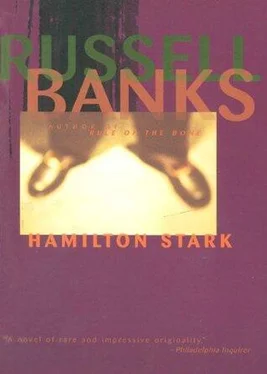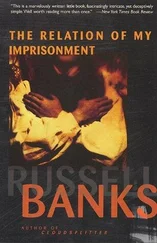Dora didn’t know what to make of this show of apparent anger. She felt as if she had walked into the middle of a play, one of those modern plays where the characters never speak and act in the ways you expect them to speak and act. Even the minister looked angry, standing there at the foot of the grave, his Bible in his hand, glaring down at the gravestone and then scowling into the book as he read the half-dozen sentences that committed Alma Stark’s mortal remains to the earth. Was this how the people of this town expressed their grief? Who were they angry at? It almost seemed they were angry with God Himself for having taken the old woman from them. But she knew that couldn’t be true — surely, Alma had not been that passionately loved a mother and grandmother, that steadfast and selfless a friend and neighbor. Surely, she could not have been so desperately mourned that her survivors would blaspheme the God who had taken her from them.
The minister, having completed the requisite benediction, gave the signal to the two men from Heywoods’ Funeral Home to lower the casket, and then he spun around and stalked across the roadway to the car, with the others immediately following. As the casket hissed hydraulically into the cold, dark earth, Dora suddenly found herself alone, and she started to rush after Mooney and his wife Sarah, who were already grimly getting into their car. Glancing back at the gravestone as she passed alongside the grave, she saw with mild surprise that the single large stone had been put there to mark two graves, not one. On the left of the polished face of the stone it read HORACE MOORE STARK, with the dates 1892–1963, and on the right half of the face it read ALMA BRAITHWAITE STARK, with the year of her birth, 1893– and a blank space left for the year of her death, 1973.
Was there something about this stone, Dora wondered, that had angered them? Why? What was wrong with the stone? It seemed perfectly appropriate to her — the husband, Horace, had died first, in 1963, she could see that, and naturally the wife, knowing she would someday be buried next to him, had placed a single stone to mark both graves, leaving blank the place where the year of her own death would eventually be carved. Dora was sure that many surviving wives and husbands handled the matter precisely in this manner. The alternative, she thought, as she got into the back seat of Mooney’s car, was to employ two separate stones and to leave the selection of each stone and its placement entirely in the hands of the survivors of each partner, which, she reasoned, would probably be a slightly more expensive and complicated way of doing it, but at least it would have the advantage of not trying to anticipate the order in which the various members of a family would die, who would be the survivors and who would not. And one would not, year after year, every time one came out to the cemetery, to pay one’s respects to the memory of one’s dead husband, have to look on one’s own gravestone, with that blank space for the date of one’s death beckoning to one, impatiently reminding one who was next, suggesting by its very incompleteness that one was late, was overdue, urging one to rush, to come down sooner to the earth.
They were almost back to the church, and none of the three in the car had said a word. Then, in a low, frightened voice, Dora asked, “Did Hamilton have that gravestone installed on his own?” knowing that the answer would be yes, and knowing that he had done it without ever having mentioned it to any of them, not to his mother and not to either of his sisters, and knowing, too, that they had discovered its presence one afternoon, doubtless one Memorial Day, when they all had gone out to the cemetery with Alma to place flowers on the old man’s grave, which up to then had probably been marked by a modest brass plaque laid flat in the ground, the conventional way for survivors to put off the expense and the usually painful negotiations with one another that accompany the selection and purchase of a large, permanent, granite marker.
Mooney stopped in front of the church. Hamilton’s green Chrysler was slightly ahead of him and on the other side of the road. Dora had reached for the handle to open the door when suddenly Sarah spun in her seat and faced her. Her wide face was torn unexpectedly with furious weeping and she bellowed into Dora’s shocked face, “You fool! You fool! I don’t even feel sorry for you!” Then she began to sob and turned away, burying her face in her hands. Her husband said nothing. He reached one hand across and patted his wife’s knee; it was a practiced gesture, a fruitless one, but one he could not let himself forgo.
Slowly, silently, Dora got out of the car, crossed the road, and started to walk to Hamilton’s car. She knew the woman was right, Sarah, her husband’s own sister. For she was a fool, a pathetic, middle-aged, solitary fool, and she deserved no pity for it, none at all. Opening the heavy door of the car and holding it open for a second, she looked in at her husband, the man whose name a week ago in a dark haze she had attached to her own, and she decided, as she got into the warm interior of the car and closed the door behind her, that she would leave him, she would flee this man as soon as she dared, as soon as she no longer feared he would kill her for it.
The ringing of the telephone next to my bed clanged into my dream and woke me. I groped for a second, half-blind in the semidarkness, and found the receiver and finally stopped the ringing. As I drew the receiver to my ear I checked my watch — Was it morning or evening? What day? What night? As if by answering these questions one might know who would be calling and breaking so unexpectedly into one’s sleep. And while my eyes, fixed on the luminous face of my watch, told me that it was 6:25 A.M. and that the day was Monday, February 5, and that the year was 1975, my ear, pressed to the cool, smooth, plastic face of the receiver, told me that it was my friend C. who was calling me at this early hour, still a half-hour before sunrise.
He spoke sharply, before I myself had said a word. “ Did I wake you? ”
My mouth felt sourly dry — too much cognac and too many cigars the night before. “Well, yes, but it was time to get up anyhow. I was up late last night,” I said, as explanation for my still being in bed a half-hour before sunrise. (C. sleeps almost not at all, or rather, never for longer than two or three hours at a time; over a period of twenty-four hours, however, he probably averages eight full hours of deep sleep — but as a result, he has lost touch with normal, if not exactly “natural,” sleeping habits, and thus I never know when he will call me and I never know when not to call him.) “Working,” I added guiltily.
“Ah, yes. On your novel.”
There was no point in my denying it, so I said nothing. The room was filled with soft, dark shadows, as if it were under water, and I sensed a snowstorm coming.
“Well, I wanted to know if she’s all right.”
“Who?”
“Oh, sorry! Dora. Or the one you call Dora. I’ve been reading your Chapter Ten and sitting here pondering her fate, and I must confess it, you’ve given me cause for concern, even alarm.”
“Alarm?” This surprised me. “For whom?”
“Why, for Dora. Or whoever she is — A.’s fifth ex-wife. Is she all right?”
“All right? Well, yes, yes… I mean, I suppose so. She left him over a year ago, you know. Why, what’s wrong?”
“Is she back with her husband, the haberdasher?” he asked nervously.
“Oh, yes, certainly. They were married again, the day her divorce from Hamilton, A., came through. Sometime early this winter, as I recall. No. C., Dora’s fine now, fine. She’s even gone back to her old job at the typesetting company. I imagine her time with Hamilton, I mean A., seems like a bad dream to her now. Which, of course, is a shame.”
Читать дальше












